- Learning time
- 30 minutes
- First play time
- 150 minutes
Spheres of Influence
Designed by: Josh Lamont
Spheres of Influence is a game of world combat and conquest, as players seek to expand and establish their dominance across the globe. Clearly influenced by Risk, it’s nonetheless its own game, and – we would say – a distinct improvement on its predecessor.
Players begin with some turn cards and all the cubes (military units) of their colour. The board is a map of the world broken up into eighteen spheres of influence, each sphere comprised of several regions and each region showing a production number and possibly an Oil Production or Area of Interest symbol too. These three elements are the heart of the game, because at the start of each round your production number (in all the regions you control, added up) defines how many units you can add to the board. Each player will get at least two turns in each round, but you can bump this up substantially by controlling the flow of oil – ie, controlling regions with the oil symbol. Finally whenever you take control of a region with an area of interest symbol, you can take a special card (more on those in a moment).
There are only four things you can do on your turn – move units (into an empty, adjacent space), attack (into a hostile adjacent space) pass (if you cannot, or choose not to act) or annex (with four players or less, each player controls two factions and annexing allows them to cede positions between them). There are some extra wrinkles involving sea movement and attacking (a simple dice-rolling system that resolves very quickly) and the aforementioned special cards – these have an event on them that can be played, but a special card can also be discarded to add an extra unit to the map at the start of a round, or – critically – roll an extra die during combat.
But crucially, whilst you know how many turns you’ll get in a round, you won’t know when they’re going to occur until they arrive. At the start of each round the turn cards are shuffled together and revealed one by one, at which point the revealed player gets to act. This random element means there’s some real hedge-betting going on, and an understrength power can strike pre-emptively (or run from trouble!)
Your goal is to control the most spheres of influence at the end of the game, with control of most capital cities as a tie-breaker. If there is still a tie, an extra round is triggered!
The guru's verdict
-
Take That!
Take That!
At the start, very little. As the game progresses, plenty, especially as lagging players will tend to gang up on an obvious leader.
-
Fidget Factor!
Fidget Factor!
As long as you have no players prone to analysing to the nth degree, Spheres moves very fast. That said because of how each round is constructed you can sometimes be waiting a while for your turn - but you do need to see what the other players are scheming, so it's not like you're twiddling your thumbs.
-
Brain Burn!
Brain Burn!
Don't just look at the map - see who controls the oil (most turns!) and production (most reinforcements!) as these are key. But the rules are pretty light - very light for a war game - and decisions are generally tactical responses to what's happening around you.
-
Again Again!
Again Again!
If you liked Risk, this is the next step. If you hated Risk, this might go a long way to rectifying your experience.

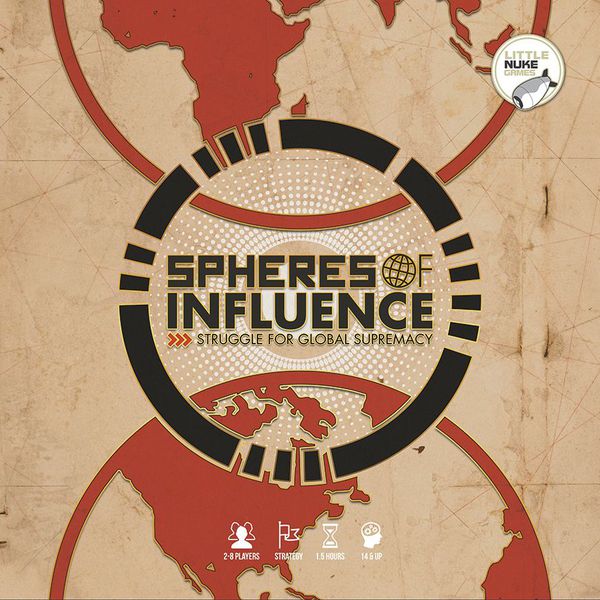



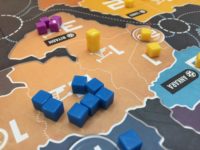
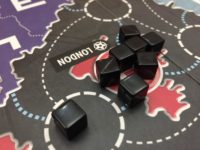
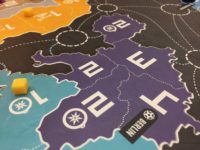


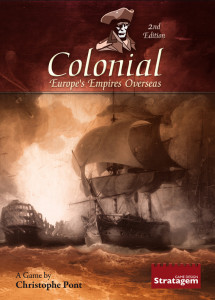
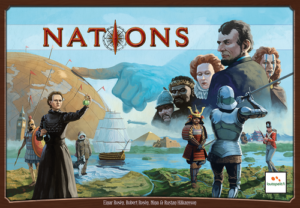
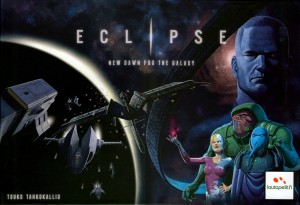
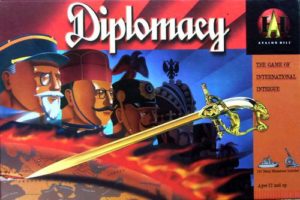
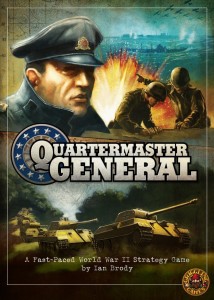
Sam says
Though I've fond (distant) memories of playing Risk, they tend to be about setting it up and embarking on this epic voyage of genocidal dice-chucking with ill-justified optimism. I'm not sure we ever actually finished a game. With Spheres of Influence the things I would say Risk gets 'wrong' (too long, too luck-dependent, kind of... a grind, ultimately) are corrected. There's a fixed set of rounds, there are the two economies of production and oil that add some real intrigue, the special cards add some flavour to the game rather than break it, and the randomized turn order is a real stroke of genius. We've had a blast playing this, with the only minor criticism for me is the idea that the second tie-breaker is a whole extra round! If you don't want to play another half an hour I'd suggest a house rule over that - or, as us humans usually fail to do, you could always rejoice in your shared victory...!